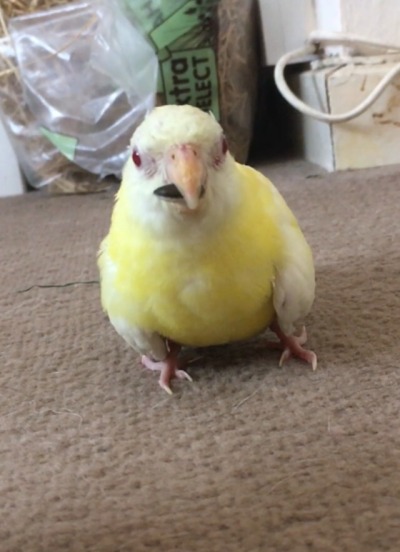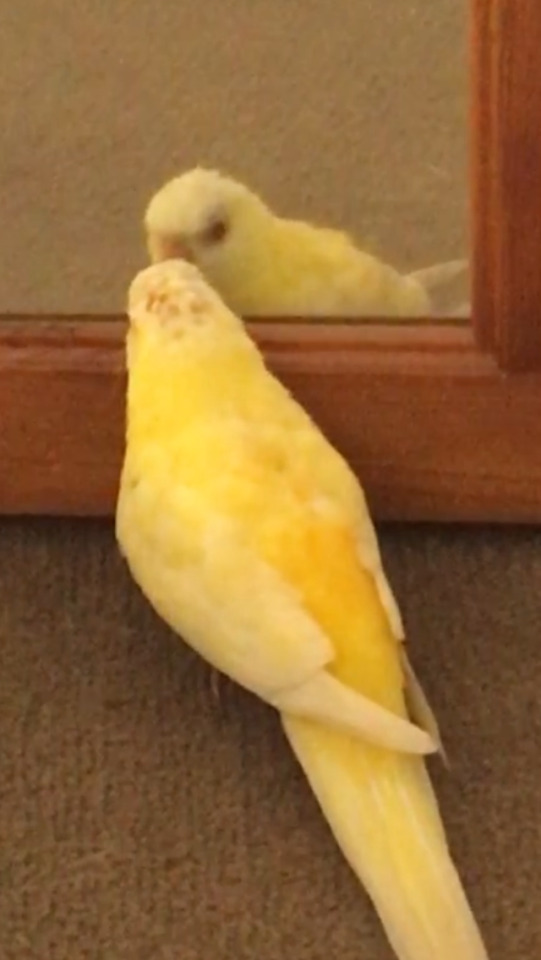Hi there,
Two days ago I ended up taking in a young (possibly fledgling?) grass parakeet that was getting bullied in an acquaintance's aviary filled with budgies. The parakeet is still ground bound, incredibly shy, and has sustained some injuries. I asked if I could take her because she was clearly having a bad time, and luckily the previous owner allowed for it.
My only experience with birds are (ungrateful) wild injured birds and a (very confident) hand reared African Grey parrot. This little girl, who I've called Mofu, is a very different experience, and I'm trying to gather a bit more advice to help her out.
Her injuries are mostly some plucked feathers around the eyes, with a healing scabby wound on the top of her head. This clearly itches as she likes to drag her head across fabrics like the towel and carpet. There's also a patch missing from the shoulder of one wing, although it seems more healed than the head wound. Yesterday her left eye was watery and sore, she was mostly squinting out of it, although today both her eyes are bright and clear now.
I don't know the age range for fledgling parakeets. Mofu is supposed to be around 20 weeks old, is this still within fledgling age or is she past this? Regardless, she cannot fly. Aside from the bald spot on her shoulder, her wings appear fine. No missing feathers or limited movement, she stretches them frequently. The closest thing she does to 'flying' is to flap out of reach, always heading for the floor. She doesn't land well whatsoever. I remember my African grey frequently smacking into walls when he first figured out flying, but he liked to aim for spots and try his best. Mofu never flies willingly except to escape from something (AKA me when I try to put her back in her cage using a perch, because I can't get close).
I've used the past 2 days to practice her accepting food from my hand. It's been very difficult, she's extremely frightened of humans. It took me lying on the floor for 3 hours yesterday for her to finally succeed in taking a sunflower seed from my fingertips. Today it took a little less than 2 hours for her to lean over my hand to take seeds from my palm, which I was using to gently curl my fingers underneath and 'pet' her neck and chest whenever she leaned in.
Her bum is a little dirty, there's some faecal matter around the area - no big clumps but enough to be noticeable. I want to help clean her but I'm too worried of pushing her too fast and undoing all of my progress, she seems a frail soul. There's no way I could handle her without her freaking out and possibly making her fear me more. I'm uncertain about when to start spraying her because I don't know if that will scare her too. I added a tub at the base of her cage with the teeniest level of water in hopes she might use it as a bird bath, but no luck as of yet.
My biggest concern however is her dubious state of balance. I'm unsure if this is simply a fledgling thing, or if it could be something more ominous regarding her injuries, but Mofu keeps falling out of the blue. Usually onto her back. She's fell from her perch multiple times without any sort of attempt to fly, she just drops like a rock and then picks herself back up and shakes it off. She's been out of the cage a couple of times, and twice now she's gone from walking on the floor to rolled on her back, it's only for a split 2 seconds, but she makes a quick panicked little vocal sound when it happens with some aggressive head turning to realign herself. Both times I saw it my heart flew out of my chest as I thought she'd broken her neck, but she'd get up so quickly like nothing was wrong that I'd feel a bit more reasonable.
Is this just general fledgling clumsiness, or should I take her to a vet to make sure there's nothing sinister? The only worry I have about taking her to the vet is once again, the lack of trust if I have to grab her to transport her there. I know these things will need to be done eventually but I really want to gain some trust from her and allow her to gain some confidence before putting her through these things. She's such a quiet bird and so gentle, so I can't help but personify her as fragile.
Here are some photo's of her head injuries I caught during yesterday's attempt of eating from my fingers (apologies for poor quality, they had to be zoomed in because of her being too scared to be any closer to me):




Any advice will be appreciated. Thank you for reading.
Two days ago I ended up taking in a young (possibly fledgling?) grass parakeet that was getting bullied in an acquaintance's aviary filled with budgies. The parakeet is still ground bound, incredibly shy, and has sustained some injuries. I asked if I could take her because she was clearly having a bad time, and luckily the previous owner allowed for it.
My only experience with birds are (ungrateful) wild injured birds and a (very confident) hand reared African Grey parrot. This little girl, who I've called Mofu, is a very different experience, and I'm trying to gather a bit more advice to help her out.
Her injuries are mostly some plucked feathers around the eyes, with a healing scabby wound on the top of her head. This clearly itches as she likes to drag her head across fabrics like the towel and carpet. There's also a patch missing from the shoulder of one wing, although it seems more healed than the head wound. Yesterday her left eye was watery and sore, she was mostly squinting out of it, although today both her eyes are bright and clear now.
I don't know the age range for fledgling parakeets. Mofu is supposed to be around 20 weeks old, is this still within fledgling age or is she past this? Regardless, she cannot fly. Aside from the bald spot on her shoulder, her wings appear fine. No missing feathers or limited movement, she stretches them frequently. The closest thing she does to 'flying' is to flap out of reach, always heading for the floor. She doesn't land well whatsoever. I remember my African grey frequently smacking into walls when he first figured out flying, but he liked to aim for spots and try his best. Mofu never flies willingly except to escape from something (AKA me when I try to put her back in her cage using a perch, because I can't get close).
I've used the past 2 days to practice her accepting food from my hand. It's been very difficult, she's extremely frightened of humans. It took me lying on the floor for 3 hours yesterday for her to finally succeed in taking a sunflower seed from my fingertips. Today it took a little less than 2 hours for her to lean over my hand to take seeds from my palm, which I was using to gently curl my fingers underneath and 'pet' her neck and chest whenever she leaned in.
Her bum is a little dirty, there's some faecal matter around the area - no big clumps but enough to be noticeable. I want to help clean her but I'm too worried of pushing her too fast and undoing all of my progress, she seems a frail soul. There's no way I could handle her without her freaking out and possibly making her fear me more. I'm uncertain about when to start spraying her because I don't know if that will scare her too. I added a tub at the base of her cage with the teeniest level of water in hopes she might use it as a bird bath, but no luck as of yet.
My biggest concern however is her dubious state of balance. I'm unsure if this is simply a fledgling thing, or if it could be something more ominous regarding her injuries, but Mofu keeps falling out of the blue. Usually onto her back. She's fell from her perch multiple times without any sort of attempt to fly, she just drops like a rock and then picks herself back up and shakes it off. She's been out of the cage a couple of times, and twice now she's gone from walking on the floor to rolled on her back, it's only for a split 2 seconds, but she makes a quick panicked little vocal sound when it happens with some aggressive head turning to realign herself. Both times I saw it my heart flew out of my chest as I thought she'd broken her neck, but she'd get up so quickly like nothing was wrong that I'd feel a bit more reasonable.
Is this just general fledgling clumsiness, or should I take her to a vet to make sure there's nothing sinister? The only worry I have about taking her to the vet is once again, the lack of trust if I have to grab her to transport her there. I know these things will need to be done eventually but I really want to gain some trust from her and allow her to gain some confidence before putting her through these things. She's such a quiet bird and so gentle, so I can't help but personify her as fragile.
Here are some photo's of her head injuries I caught during yesterday's attempt of eating from my fingers (apologies for poor quality, they had to be zoomed in because of her being too scared to be any closer to me):




Any advice will be appreciated. Thank you for reading.